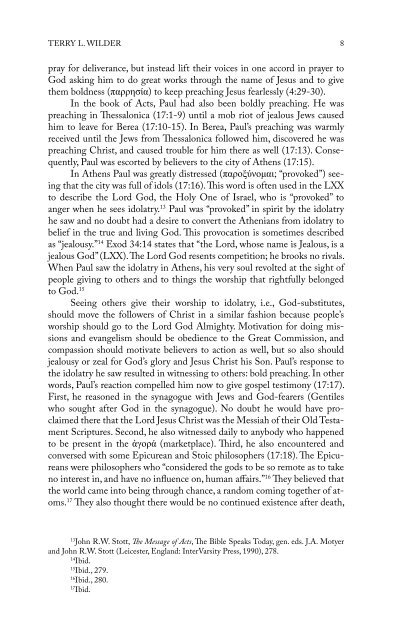The Theology of Missions
The Theology of Missions
The Theology of Missions
You also want an ePaper? Increase the reach of your titles
YUMPU automatically turns print PDFs into web optimized ePapers that Google loves.
Terry L. Wilder 8<br />
pray for deliverance, but instead lift their voices in one accord in prayer to<br />
God asking him to do great works through the name <strong>of</strong> Jesus and to give<br />
them boldness (παρρησία) to keep preaching Jesus fearlessly (4:29-30).<br />
In the book <strong>of</strong> Acts, Paul had also been boldly preaching. He was<br />
preaching in <strong>The</strong>ssalonica (17:1-9) until a mob riot <strong>of</strong> jealous Jews caused<br />
him to leave for Berea (17:10-15). In Berea, Paul’s preaching was warmly<br />
received until the Jews from <strong>The</strong>ssalonica followed him, discovered he was<br />
preaching Christ, and caused trouble for him there as well (17:13). Consequently,<br />
Paul was escorted by believers to the city <strong>of</strong> Athens (17:15).<br />
In Athens Paul was greatly distressed (παροξύνομαι; “provoked”) seeing<br />
that the city was full <strong>of</strong> idols (17:16). This word is <strong>of</strong>ten used in the LXX<br />
to describe the Lord God, the Holy One <strong>of</strong> Israel, who is “provoked” to<br />
anger when he sees idolatry. 13 Paul was “provoked” in spirit by the idolatry<br />
he saw and no doubt had a desire to convert the Athenians from idolatry to<br />
belief in the true and living God. This provocation is sometimes described<br />
as “jealousy.” 14 Exod 34:14 states that “the Lord, whose name is Jealous, is a<br />
jealous God” (LXX). <strong>The</strong> Lord God resents competition; he brooks no rivals.<br />
When Paul saw the idolatry in Athens, his very soul revolted at the sight <strong>of</strong><br />
people giving to others and to things the worship that rightfully belonged<br />
to God. 15<br />
Seeing others give their worship to idolatry, i.e., God-substitutes,<br />
should move the followers <strong>of</strong> Christ in a similar fashion because people’s<br />
worship should go to the Lord God Almighty. Motivation for doing missions<br />
and evangelism should be obedience to the Great Commission, and<br />
compassion should motivate believers to action as well, but so also should<br />
jealousy or zeal for God’s glory and Jesus Christ his Son. Paul’s response to<br />
the idolatry he saw resulted in witnessing to others: bold preaching. In other<br />
words, Paul’s reaction compelled him now to give gospel testimony (17:17).<br />
First, he reasoned in the synagogue with Jews and God-fearers (Gentiles<br />
who sought after God in the synagogue). No doubt he would have proclaimed<br />
there that the Lord Jesus Christ was the Messiah <strong>of</strong> their Old Testament<br />
Scriptures. Second, he also witnessed daily to anybody who happened<br />
to be present in the ἀγορά (marketplace). Third, he also encountered and<br />
conversed with some Epicurean and Stoic philosophers (17:18). <strong>The</strong> Epicureans<br />
were philosophers who “considered the gods to be so remote as to take<br />
no interest in, and have no influence on, human affairs.” 16 <strong>The</strong>y believed that<br />
the world came into being through chance, a random coming together <strong>of</strong> atoms.<br />
17 <strong>The</strong>y also thought there would be no continued existence after death,<br />
13<br />
John R.W. Stott, <strong>The</strong> Message <strong>of</strong> Acts, <strong>The</strong> Bible Speaks Today, gen. eds. J.A. Motyer<br />
and John R.W. Stott (Leicester, England: InterVarsity Press, 1990), 278.<br />
14<br />
Ibid.<br />
15<br />
Ibid., 279.<br />
16<br />
Ibid., 280.<br />
17<br />
Ibid.

















